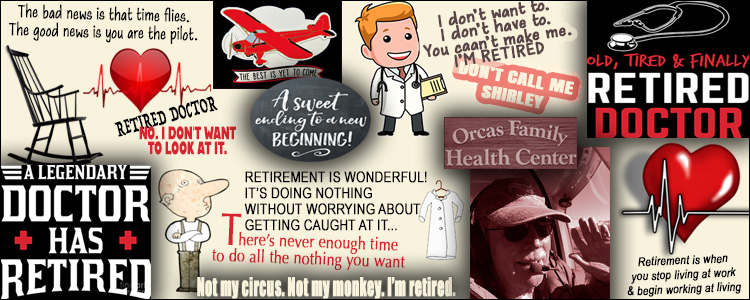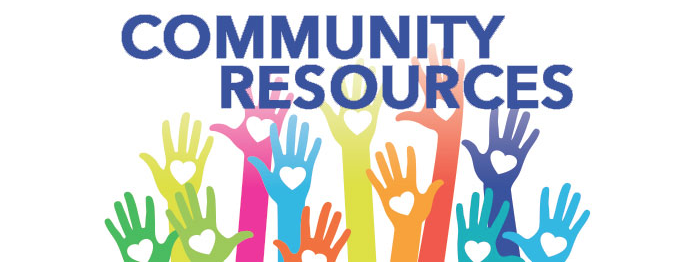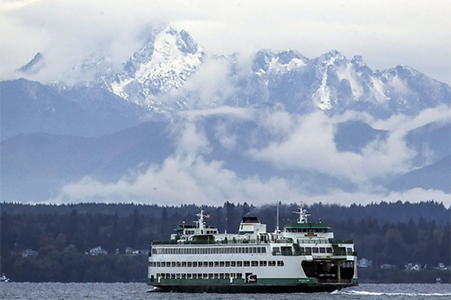Retirement celebration has been postponed due to COVID concerns
||| BY LIN MCNULTY, theORCASONIAN EDITOR |||
Although I attended high school with David Shinstrom, I didn’t know him. It was a large enrollment back in the 60s; he was a sophomore and I a senior, and probably neither of us was interested in the least in meeting. And I certainly would not have looked down the hall, thinking: “OMG, that little punk kid is going to be my doctor someday.”
When I finally did have the occasion to meet David Shinstrom, long about 1993, he was an M.D. on Orcas Island. Then, the moment I saw him, all I could think was “be still my beating heart.” It was tachycardia, though, that brought me, via EMS, to the Orcas Medical Center, not to actually meet a fellow Lake Washington High School student.

David Shinstrom in his pilot role.
Wanderlust… That’s where he wished to begin his interview last month — obviously itching to enter this new future now that he has announced his retirement. But we needed to catch up on some other items first: Like how he happened to be an M.D. on Orcas Island, or even how he came to discover Orcas in the first place. (Aha! Of course! He was a Camp Orkila alumni.)
David Shinstrom graduated high school in 1966 in Kirkland, and set his sights across the mountains to Whitman College. He did not have his sights on a future medical career. But when so many of his friends applied, he jumped on the med school wagon, he thought ‘what the hell.’ He was accepted at Cincinnati College of Medicine, which was followed by a three-year internship in Augusta, Maine. It was a fait accompli.
He next spent five years as the doc in Forks, WA, before moving back East in 1983 to accept a faculty appointment at Maine-Dartmouth Family Medicine, where he instructed medical residents.
The rest of this story now begins the island history portion because some 10 years later, he happened across a job posting in a medical journal about a position available on Orcas Island. That brought him to the islands
Back in 1993 through 2003, management of the Orcas Medical Center (OMC) was in the hands of Island Hospital. A vote in 2000 to create a Hospital District had failed by a mere 47 votes. With no reason offered, Shinstrom was relieved of his position at Orcas Medical Center after 10 years.
It was at this time that Orcas Family Health Clinic was founded as a 501(c)(3) non-profit rural health center providing access to primary healthcare and related medical services, with the motto “Healthcare For All.” Mid-level practitioners were eventually hired to help with the patient load, as well locum tenens so the clinic doctor (who did not draw a salary) might get time off once in awhile. This allowed the new clinic to bring back patients and focus on long-term care, and the patient load at OFHC eventually reached 3,000 patients.
This now-retired doctor seems reticent to share details of his 20+ years on Orcas, unable to pick a specific memorable incident. Perhaps that’s the result of too many memories, too many incidents. But a former visitor to the island never forgot her encounter with Dr. Shinstrom on Orcas, and her story perhaps best encapsulates the doctor’s career:
I met Dr Shinstrom quite by accident in his early years on Orcas Island when I was accompanying a group known in Central Washington as “Trail Seekers,” a program designed to work with disadvantaged boys age 5 – 7 — each accompanied by a teenage (age 15 -19) mentor — to an Orcas encampment for a week every year in June.
The first year of the project we loaded up 30 little boys, 30 teenage mentors, 17 adults, food, and camping gear into a caravan of cars, vans, pickups and set off across the mountain headed to Orcas on a beautiful Sunday morning. As we neared the summit on Snoqualmie Pass I noticed one of the boys in my car, (for the telling of this story I will refer to him as Jose) was experiencing some discomfort, but nothing that seemed too alarming, so we pushed on to catch the ferry in Anacortes. Once on board it became apparent Jose was even less active than he had been earlier in the day, but was clearly thrilled by the ferry experience.
By the time we reached Orcas he could no longer hide his pain. We quickly shuffled my three other passengers and their belongings into accompanying rigs. Jose and I were off to find the clinic. Arriving late on a Sunday afternoon there was a sign on the door “In Case of Emergency Call this Number.” This was definitely an emergency. Hearing our story the doctor on call appeared in the parking lot within minutes. After a brief exam he determined the pain was an appendicitis attack and we needed to move Jose back to Anacortes to the hospital.
I explained the situation: there was no money, no insurance and highly unlikely any kind of Medicaid. The doctor just shrugged his shoulders, picked up the phone, called the hospital to let them know we would be coming. When I inquired how long until the next ferry so we might get off the island as soon as possible, he instructed me to put Jose back in my car and follow him to what would turn out to be the Orcas airport.
I will never forget pulling into the parking area and seeing the doctor push his plane out onto an appropriate spot. I watched him gently load Jose into the right seat, buckle him up, place his headphones and give him a manly pat on the back while I climbed into the rear seat. As we headed down the runway and flew off the island on that absolutely gorgeous blue sky day I could see Jose’s face light up. In spite of being doubled up with pain that little boy was elated. He kept looking out the window and then back at the doctor with a giant grin. When we landed the doctor loaded us into his car, which was parked at the airport, and drove us to the hospital where he helped get Jose admitted; then he disappeared.
Jose recovered and grew up with a wonderful childhood story to tell. All ended well because of a very special doctor whose name, in the middle of all the drama, I had failed to remember. But this is not the end of the story. Many years later I was invited by a friend to join his friend for a 4th of July celebration on Orcas Island. My friend referred to our host as “Shine” a college nickname. We arrived early in the evening and when greeted at the door I immediately knew I recognized this man — from somewhere. As the evening wore on and I learned he was a physician it finally dawned on me that this was the man who had been so kind and so generous long long ago. I asked if he remembered me. He did not. I then related the story about 6-year-old Jose suffering an appendicitis attack, the doctor’s quick response, appearing immediately on a Sunday afternoon, flying and transporting us to Island Hospital in Anacortes and then flying away with nothing in return except my appreciation.
He did not remember.
I believe without a doubt this is the best part of the story, because it says “this is what Dr. Dave Shinstrom does so frequently that it is simply part of his day as a person and a physician.”
This encounter, without exception, is the single most perfect health care moment I have ever experienced. Everything was about the patient. Nothing about how to transport, money, insurance or a myriad of other things that seem to get in the way of providing care at times. It was simply … Take care of the patient!
Dr. Shinstrom originally came to Orcas with the goal of establishing a stable medical practice and putting an end to the revolving doctor history. So, he stuck it out. Who would have imagined it would take over 27 years? But he now believes that goal has finally been achieved.

Dr. David Shinstrom.
A highlight of his career, he notes, has been his huge support of End of Life Washington, the program that allows terminal patients to choose to end their life. He has participated in scores of patients seeking medication to end their life — both as attending and consulting physician. “Giving patients that choice is hugely important to me. Folks may think it macabre, but believe me, to participate in an individual exercising their legal right to end their life is an honor which I gladly fulfill.” He has attended the death of dozens of patients on Orcas and is amazed by the courage it takes to drink that liquid. “None of us can know what their mind is thinking to make that choice,” he continues. “But, I wholeheartedly support an individual being able to make that choice.”
But back to this gnawing wanderlust: David says he needs to get the lay of the land, to look around, and to travel. He intends to retain his base on Orcas Island, but indicates he would like to go somewhere warm in the winter, and he’s got thoughts beating around his brain to get a sailboat … and just go. It can be tough to make a decision when you can do anything you want.
A get-together to commemorate and pay tribute to the good doctor had been scheduled, but the COVID pandemic has other ideas.
Share your favorite Dr. David Shinstrom (“Shine”) story in the comments.
**If you are reading theOrcasonian for free, thank your fellow islanders. If you would like to support theOrcasonian CLICK HERE to set your modestly-priced, voluntary subscription. Otherwise, no worries; we’re happy to share with you.**








I want to say a Big Thank You to Dr Dave for his care over the years !
Dr. Dave has been Monique and my doctor since the first day we arrived on Orcas in 1998. He treated us for all
our illnesses and was always there when needed. When Monique developed cancer, he was not just a doctor but a
friend. On multiple occasions, when called, he would come to our house no matter what time of day or night. When Monique was passing, he came to our house, and sat there with her, holding her hand. His gentleness,
compassion and understanding is something rarely seen in a doctor now days. Thank Dr. Dave, in more ways than
you can imagine.
Ladd Lindholm Sept. 15, 2021
As my wife struggled with other medical facilities and their take on my wife’s illness (MDS), she became more shallow, with no real future to look forward too.
Joan came home one day and she was brighter and more energetic in tone….she had just seen Dr. Dave. Joan told me she had talked to him about her MDS and ….my not being there, comforted her in her wish to live as best she could with dignity, and ,when not possible, end her days. This was a subject Mr. Shinstrom helped and gave a gentlness and comfort to Joan which others were unable , unwilling , or not allowed ,…for this I am grateful…. I am so thankful for what Dr. Shinstrom did and wish the very best on a new journey
s
Dear DAve,
Thanks for treating patients as individuals -a rarity in this corprotized medicine.
Single payer or bust.
Joseph Murphy
Thanks for a positive, feel-good story. From one island-serviing pilot-MD to another, enjoy your flying retirement!
David Did… that’s enough. His style, which may be different for a few, tended to A lot of Islanders.
His abilities were exercised daily, not only with his hands but his oversight. I thank you David for all the good you brought to your community.
To serve as a General Practitioner with such a large audience, you are an example of Care giving.
Thank you, may your time onward be as exciting and rewarding knowing you fought the good fight! And left us better for it!!
I came to Orcas for a third EMS career as a firefighter / Paramedic in 2005; so naturally Dr. David Shinstrom was one of the first people I was introduced to.
It has been a pleasure and privilege serving his patients. Dave Shinstrom has always been there for his patients; but also for family friends, tourists, pets, and especially the poor and the non-insured residents of Orcas Island.
Dr. David Shinstrom is leaving a legacy of care and good will. Wishing you all the best in your next adventure! You will be missed.